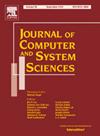加性同态加密的线性时间二部分安全合并
IF 1.1
3区 计算机科学
Q1 BUSINESS, FINANCE
引用次数: 0
摘要
我们提出了一种线性时间、空间和通信数据遗忘算法,用于在双方设置中安全地将两个私有的排序列表合并为一个单独的排序的秘密共享列表。虽然合并两个排序列表可以在线性时间内不安全地完成,但以前的安全合并算法都需要超线性时间和通信。我们构建的一个关键特征是一种新颖的方法,可以按排序顺序无意地遍历排列列表。我们的算法只需要黑盒使用底层的加性同态密码系统和通用安全计算协议进行比较和等式测试。本文章由计算机程序翻译,如有差异,请以英文原文为准。
Linear-time 2-party secure merge from additively homomorphic encryption
We present a linear-time, space and communication data-oblivious algorithm for securely merging two private, sorted lists into a single sorted, secret-shared list in the two party setting. Although merging two sorted lists can be done insecurely in linear time, previous secure merge algorithms all require super-linear time and communication. A key feature of our construction is a novel method to obliviously traverse permuted lists in sorted order. Our algorithm only requires black-box use of the underlying additively homomorphic cryptosystem and generic secure computation protocols for comparison and equality testing.
求助全文
通过发布文献求助,成功后即可免费获取论文全文。
去求助
来源期刊

Journal of Computer and System Sciences
工程技术-计算机:理论方法
CiteScore
3.70
自引率
0.00%
发文量
58
审稿时长
68 days
期刊介绍:
The Journal of Computer and System Sciences publishes original research papers in computer science and related subjects in system science, with attention to the relevant mathematical theory. Applications-oriented papers may also be accepted and they are expected to contain deep analytic evaluation of the proposed solutions.
Research areas include traditional subjects such as:
• Theory of algorithms and computability
• Formal languages
• Automata theory
Contemporary subjects such as:
• Complexity theory
• Algorithmic Complexity
• Parallel & distributed computing
• Computer networks
• Neural networks
• Computational learning theory
• Database theory & practice
• Computer modeling of complex systems
• Security and Privacy.
 求助内容:
求助内容: 应助结果提醒方式:
应助结果提醒方式:


